North Carolina Last Will and Testament Form
A North Carolina last will and testament is a legal instrument that contains the directions of an individual (testator) related to their estate distribution among their selected heirs. The document must be made in the format prescribed by the state’s law and signed by at least two disinterested adult witnesses.
Below, we offer a free downloadable will template available in PDF and DOCX formats and answer some of the common questions you could have regarding this document. Be sure to read all the requirements before getting started.
NC Will Laws and Requirements
| Requirements | State laws | |
| Statutes | Chapter 31 – Wills | |
| NC Will Definition | § 31-3.2. Kinds of wills | |
| Signing requirement | Two witnesses | § 31-3.3. Attested written will |
| Age of testator | 18 or older | § 31-1. Who may make will |
| Age of witnesses | 18 or older | § 31-8.1. Who may witness |
| Self-proving wills | Allowed | § 31-11.6. How attested wills may be made self-proved |
| Handwritten wills | Recognized if meets certain conditions | § 31-3.3. Attested written will |
| Oral wills | Recognized if meets certain conditions | § 31-3.5. Nuncupative will |
| Holographic wills | Recognized if meets certain conditions | § 31-3.4. Holographic will |
| Depositing a will | Possible with the clerk of the superior court in each county of North Carolina (The fee is county-specific) | § 31-11. Depositories in offices of clerks of superior court where living persons may file wills |
How to Write a Will in North Carolina
1. Consider your alternatives. One important thing to decide upon, first of all, is whether you want to write the whole thing by hand (holographic will) or use a fillable last will and testament template accessible here in PDF and Word formats. You can also get it done via our document software that will take you through the whole process of will creating step-by-step.
2. Indicate who the testator of the will is. Step one is establishing the testator by filling out their full legal name, followed by the residential information (city, county, and state).
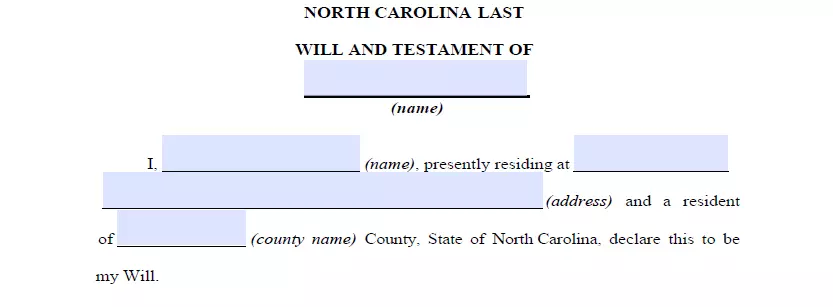
3. Specify the executor’s details. Next, decide on the executor of your property and indicate their particulars: full name and place of residence. It is recommended to appoint someone who lives in North Carolina because nonresident personal representatives would have to hire (§ 28A-4-2) a state resident as their agents, which only adds more paperwork and unnecessary hurdles.
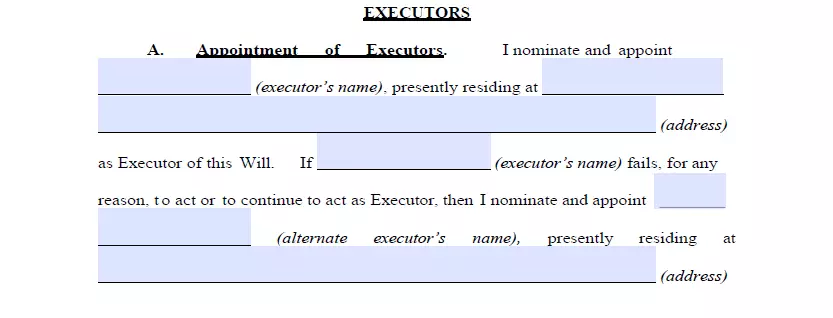
4. Choose the guardian (optional). In case you have minor or dependent children and don’t want the court to choose a guardian for them when you’re no longer here, you can select a friend or acquaintance as a guardian to take care of your children.
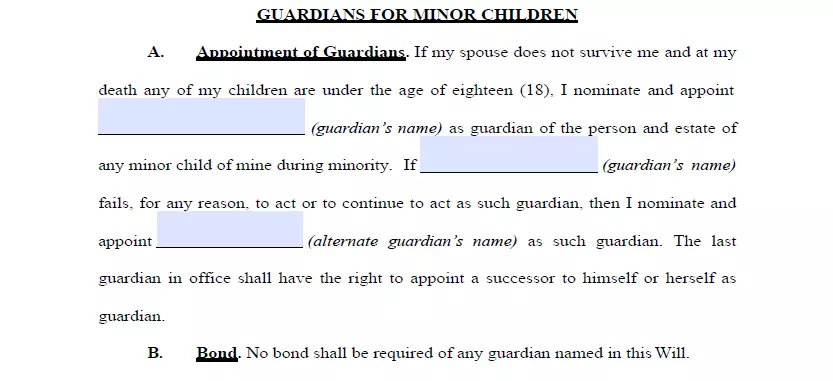
5. Indicate your beneficiaries and what they get. Now you should establish those who are going to inherit your property. Fill out their full names, addresses, and your connection to them (spouse, child, friend, and so on). Additionally, you can name an organization, church, charity, school, community group, hospital, or even a scholarship to any individual as a beneficiary in your will.
If you’ve got an asset allocation plan that is not equally proportional, it is possible to describe its details within this part. Cash, stocks, realty, business control, money for arrearage, as well as any physical items of financial value you possess can be mentioned in the will. Please be aware that there are things that cannot be distributed in the last will, for instance, life insurance and jointly owned property.
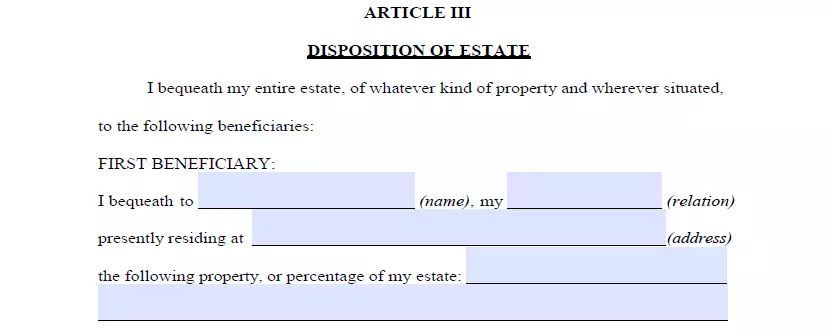
6. Ask witnesses to sign the document. North Carolina General Statutes (§ 31-3.3) specify that no less than two witnesses have to sign a last will and testament so that it is viewed as valid. It is possible to name somebody as a witness in this state only if they’re over the age of 18 years and are uninvolved in the heritage.
After a thorough revision of each paragraph in your will, all signatories (you and your two witnesses) have to write their full names and full addresses and sign the document.
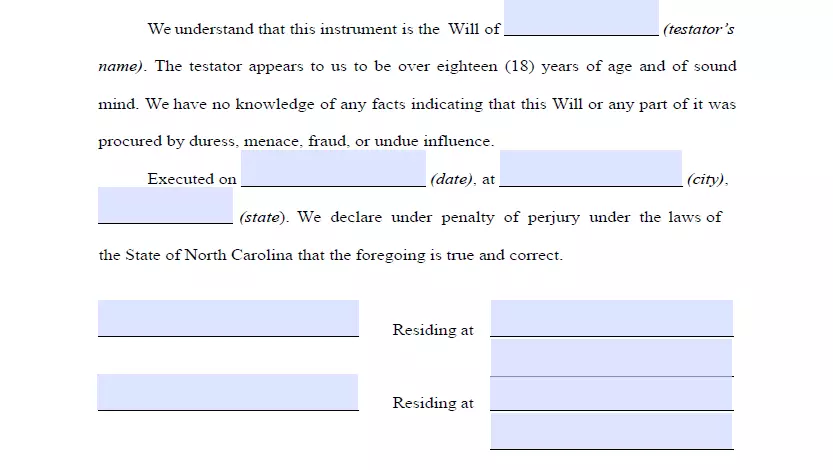
Make a Free Last Will and Testament Valid in North Carolina
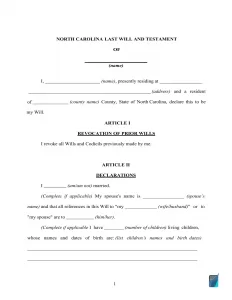

Frequently Asked Questions
Should I notarize my last will in North Carolina for it to be effective?
No, In North Carolina, there’s no need to notarize your will. But if you would like to add a self-proving affidavit to the will, you’ll need to notarize it. A self-proving last will makes probate quicker because the court won’t have to get in touch with the witnesses.
Is a handwritten will legal in NC?
Yes, provided that the testator meets the legal requirements of a person who is competent to make a will. A handwritten will must be entirely in the handwriting of the testator and signed by them with no part written by any other person. If it is not entirely in the handwriting of one person, experts may look for similarities between different parts to determine if they were all written by one hand or whether someone else participated.
Do wills have to be recorded in North Carolina?
In North Carolina, a will does not have to be recorded, but you can contact the clerk of your local superior court. Once the person who created the will has died, however, it is important that someone find and contact the original witnesses to make sure they are available if an issue arises with the validity of the document or its distribution of assets.
Can you leave out your spouse from a last will and testament?
A spouse cannot be disinherited through a will in North Carolina unless the spouse signs a written waiver of their elective share, which can be a part of a prenup or a postnup and is recommended to be notarized in North Carolina.
What if I lose my last will and testament?
There is a default presumption in North Carolina that if a will is missing, it suggests that it was revoked by the testator. However, there is a way to overcome this assumption and probate a lost will. The executor or a beneficiary should file an application for probate with the clerk and submit a death certificate, just as if they were probating an original will.
The clerk, on the other hand, will need solid proof of the following:
- Execution of the will in a proper manner.
- The contents of the last will and testament.
- That the will was not revoked in any way.
- The will was searched for thoroughly.
| Related documents | Cases when you might need to make one |
| Codicil | You would like to make a single or a few minor modifications to your will. |
| Self-proving affidavit | You want to keep from potential difficulties during the probate. |
| Living will | You want to express your wishes regarding the end-of-life medical treatment and life-prolonging procedures. |
| Living trust | You would like to consider an alternative to a will. |
Last Will and Testament Forms for Other States
